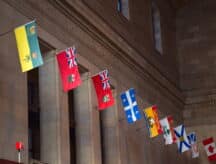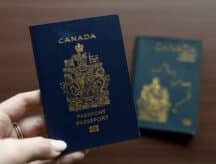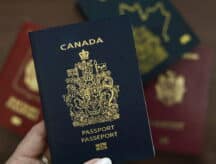World Refugee Day: How Canada empowers refugees to succeed
Today, June 20, is World Refugee Day. It is a day recognized around the globe that celebrates the success of refugees in their new lives.
More importantly, it also recognizes how much must be done to offer support and a high quality of life to people who have fled their homes, often in traumatic circumstances.
World Refugee Day has a theme each year. The 2023 United Nations High Commissioner for Refugees (UNHCR) says the theme is “Hope away from home." This is meant to promote the inclusivity of refugees in their new countries.
“Today, on World Refugee Day, the global community honours the strength and courage of millions of refugees, while showing empathy and understanding for their plight," said Canada's Immigration Minister, Sean Fraser, in an IRCC statement. "In Canada, we have a proud history of resettling the world’s most vulnerable people, and refugees play an essential role in building and strengthening our communities."
Discover if You Are Eligible for Canadian Immigration
Canada’s role in helping refugees
"Canada continues to be a leader on the world stage, with resettlement programs that save lives by offering safe haven in Canada," said Minister Fraser. "For the fourth year in a row, we were the top resettlement country in the world."
Canada has traditionally played a large part in helping refugees and works to give them a solid start once they arrive in the country. In 2022, Canada welcomed 73,330 resettled refugees and protected persons, accounting for 17.2% of all new Canadian permanent residents last year.
The 2021 census reports that between 2016 to 2021, 60,795 new Syrian-born refugees were admitted and living in Canada, accounting for nearly 30% of the new refugees in the country. At the onset of the unrest in Syria, Canada resettled 25,000 Syrians in 100 days between November 2015 and February 2016.
Iraq (15,505), Eritrea (13,965), Afghanistan (9,490) and Pakistan (7,810) were the other most common countries of birth for new refugees from 2016 to 2021.
The UNHCR says that Canada has welcomed 1,088,015 refugees since 1980. This number includes those who were recognized as refugees in Canada or who were resettled from overseas.
The country is also making progress towards its goal of welcoming 40,000 refugees from Afghanistan following the fall of its government to the Taliban.
Immigration, Refugees and Citizenship Canada (IRCC) is attempting to resettle 18,000 people under the Special Immigration Measures Program for Afghans who assisted the Government of Canada. This program applies to Afghans who were employed in an occupation with a “significant and/or enduring relationship with the Government of Canada, which could be, but is not limited to interpreters who worked with the Canadian Armed Forces or local staff who currently or used to work at the Embassy of Canada to Afghanistan.”
Other initiatives for Afghans include a pathway to permanent residence for 5,000 extended family of former Afghan interpreters. Another special program to sponsor 3,000 Afghan refugees without refugee status from the UNHCR or a foreign state is already full.
Refugees help to strengthen Canada’s labour force
IRCC recognizes that many refugees arrive in Canada with valuable skills that can be used to fill gaps in the national labour force and strengthen the economy while also helping them settle and integrate into life in Canada.
The Economic Mobility Pilot Program (EMPP) helps skilled refugees immigrate to Canada through existing economic programs and gives employers access to a new pool of qualified candidates to fill job openings. Those who are deemed eligible for the program will typically have an easier path to obtaining permanent resident status in Canada.
In December 2022, it was announced that the program, which began as a research project in 2018, would expand over the next few years to include 2000 skilled workers who can prove that they are refugees while also meeting the eligibility for programs such as the:
On June 12, IRCC launched two new streams under the EMPP. The first is the EMPP Federal Skills Job Offer Stream. Under this stream Canadian employers can hire qualified candidates to fill a wide range of in-demand jobs, including nurse aides, personal support workers, long-term care aides, software engineers, web designers, mechanical and electrical engineers and technicians, logistics and warehouse workers, tourism and hospitality workers, and truck and delivery service drivers.
There is also an EMPP Federal Skills Without a Job Offer Stream, which recognizes that certain candidates have skills that are in high enough demand that they will find work after they arrive in Canada.
The EMPP works with several settlement organizations such as Talent Beyond Boundaries, TalentLift and Jumpstart Refugee Talent. These organizations can help IRCC identify refugees with in-demand skill sets and also support refugees by helping them to develop the skills that will benefit them in Canada.
Further, a recent campaign launched by #WelcomingEconomy for Refugees aims to help employers connect with refugees who are eager to find work and use their talents in Canada. The campaign is sponsored by the Refugee Jobs Agenda Roundtable. The Roundtable works year-round to increase refugees’ access to meaningful employment opportunities.
There are also many employers in Canada that make it a point to hire refugees. For example, Starbucks Canada has hired 800 refugees over the past four years and employers such as Day & Ross, FedEx, HMS Host, IKEA Canada, Martinrea Automotive, McDonald’s, Metro, Shopify, Sodexo, Staples, and Wealthsimple have participated in refugee hiring events.
How do refugees fare in Canada?
Those who arrive in Canada as refugees tend to prosper over time. The average income for refugees the first year after arrival is only $20,000. However, UNHCR reports that most refugees become middle-class within five years of their arrival.
Refugees pay more in income tax than they receive in public benefits and services. Further, there is a higher rate of entrepreneurship among refugees than those who are Canadian-born. The UNHCR report shows 14.4% of refugees who have been in Canada between 10 and 30 years are entrepreneurs, compared to 12.3% of people born in Canada. These refugees are creating jobs and businesses that benefit all Canadians and newcomers.
Refugees are also the most likely of all immigrants to become Canadian citizens. The same report found that 89% of refugees become citizens compared to 84% of economic class immigrants and 80% of family class immigrants.
- Do you need Canadian immigration assistance? Contact the Contact Cohen Immigration Law firm by completing our form
- Send us your feedback or your non-legal assistance questions by emailing us at media@canadavisa.com







